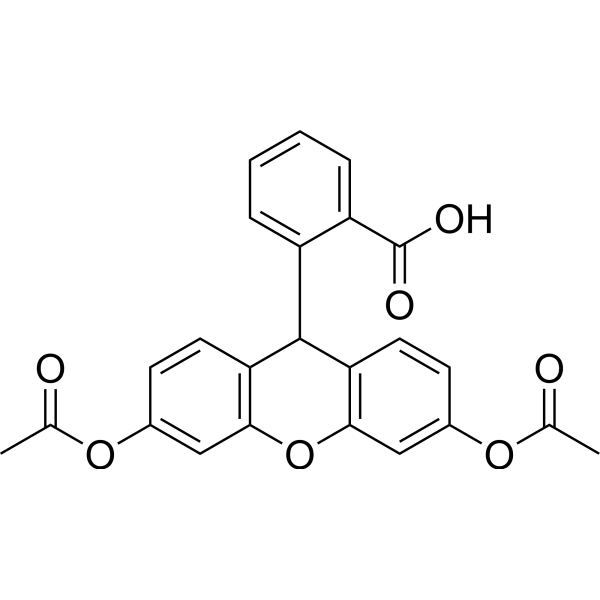
Dihydrofluorescein diacetate
CAS No. 35340-49-9
Dihydrofluorescein diacetate ( Diacetyldihydrofluorescein )
产品货号. M27035 CAS No. 35340-49-9
二氢荧光素二乙酸酯是一种荧光探针,用于测量无细胞系统和细胞模型中的氧化应激。
纯度: >98% (HPLC)
 COA
COA
 Datasheet
Datasheet
 HNMR
HNMR
 HPLC
HPLC
 MSDS
MSDS
 Handing Instructions
Handing Instructions
| 规格 | 价格/人民币 | 库存 | 数量 |
| 50MG | ¥462 | 有现货 |


|
| 100MG | 获取报价 | 有现货 |


|
| 200MG | 获取报价 | 有现货 |


|
| 500MG | 获取报价 | 有现货 |


|
| 1G | 获取报价 | 有现货 |


|
生物学信息
-
产品名称Dihydrofluorescein diacetate
-
注意事项本公司产品仅用于科研实验,不得用于人体或动物的临床与诊断
-
产品简述二氢荧光素二乙酸酯是一种荧光探针,用于测量无细胞系统和细胞模型中的氧化应激。
-
产品描述Dihydrofluorescein diacetate is a fluorescent probe for measuring oxidative stress in cell-free systems and cellular models.(In Vitro):Dihydrofluorescein diacetate is able to detect the presence of ROS in mitochondria. Dihydrofluorescein diacetate fluorescence sharply delineates filaments that correspond in all detail to TMRM-stained mitochondria. It enters mitochondria and reacts with ROS released in the matrix. Dihydrofluorescein diacetate may be a useful quantitative method to measure the oxidation potential of nanoparticle-treated cells. Dihydrofluorescein diacetate shows fluorescence of linear structures, consistent with mitochondria, in reoxygenated endothelium.
-
体外实验Dihydrofluorescein diacetate may be a superior fluorescent probe for many cell-based studies. It is a better fluorescent probe for detecting intracellular oxidants because it is more reactive toward specific oxidizing species. Dihydrofluorescein diacetate demonstrates fluorescence of linear structures, consistent with mitochondria, in reoxygenated endothelium. Dihydrofluorescein diacetate is able to detect the presence of ROS in mitochondria. Dihydrofluorescein diacetate fluorescence was sharp and delineated thin filaments which corresponded in all details to TMRM-stained mitochondria. It enters mitochondria and reacts with ROS released in the matrix. Dihydrofluorescein diacetate could be an useful and quantitative method for measuring the oxidative potential of nanoparticle-treated cells.
-
体内实验——
-
同义词Diacetyldihydrofluorescein
-
通路Others
-
靶点Other Targets
-
受体S1P
-
研究领域——
-
适应症——
化学信息
-
CAS Number35340-49-9
-
分子量418.401
-
分子式C24H18O7
-
纯度>98% (HPLC)
-
溶解度In Vitro:?DMSO : ≥ 106.5 mg/mL (254.54 )
-
SMILESCC(=O)Oc1ccc2C(c3ccc(OC(C)=O)cc3Oc2c1)c1ccccc1C(O)=O
-
化学全称——
运输与储存
-
储存条件(-20℃)
-
运输条件With Ice Pack
-
稳定性≥ 2 years
参考文献
1.Lee H, et al. 4-Deoxypyridoxine improves the viability of isolated pancreatic islets ex vivo. Islets. 2013 May-Jun;5(3):116-21.
产品手册




关联产品
-
Val-Cit
Val-Cit 是一种可裂解的 ADC 连接子,用于合成抗体药物偶联物 (ADC)。
-
AZ13705339
AZ13705339 是一种有效的选择性 PAK1 抑制剂,IC50 为 0.33 nM。
-
Bermoprofen
Bermoprofen (AD-1590) 是一种具有口服活性地非甾体类抗炎药。Bermoprofen 具有有效的解热作用,且生物半衰期短。Bermoprofen 是 LPS 诱导的兔发烧的有效拮抗剂。



 021-51111890
021-51111890 购物车()
购物车()
 sales@molnova.cn
sales@molnova.cn







